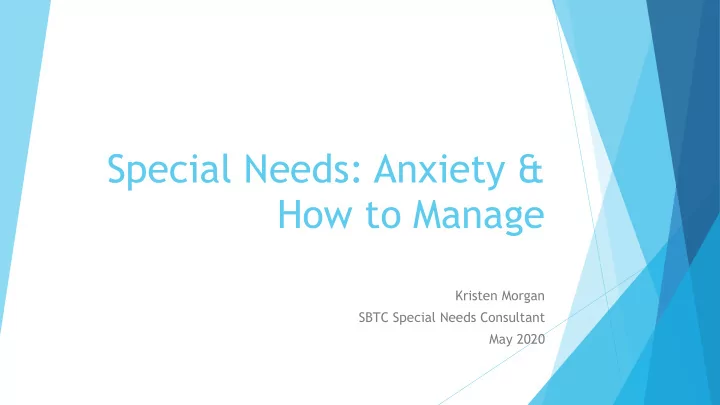

Special Needs: Anxiety & How to Manage Kristen Morgan SBTC Special Needs Consultant May 2020
Anxiety u An internalizing symptom, meaning that it occurs inside of our bodies as both physical feelings and anxious thoughts. u Example: a child who is anxious about COVID-19 may have physical symptoms – upset stomach, racing heart – as well as negative thoughts – “What if I get the disease?” Covid-19 & Children with Special Needs: How to Manage Anxiety article written by Dr. Jamie Barstein, child clinical psychologist at The Help Group u There are essentially three components of anxiety: Cognition (thoughts) : Children with anxiety tend to perceive danger and threats readily. They u experience false alarms, overestimate the probability of catastrophe, and underestimate their ability to cope and survive. Physical symptoms: These include heart pounding, sweating, tension, difficulty breathing, u nausea, stomach upset, and/or insomnia. Behaviors: Children exit a situation as soon as they perceive danger or have uncomfortable u physical symptoms. Helping A Child with Anxiety By Janneta K. Bohlander, L.M.F .T, Smart Kids with Learning Disabilities
Anxiety & Disabilities u It is estimated that up to 40% of individuals with autism experience anxiety, and studies have reported similar rates in individuals with intellectual disabilities. u Anxiety is one of the most common emotional problems among children with LD and ADHD. u For a child who is high-functioning autistic, a parent might have to point out social queues. For a handicapped child, their anxiety might be brought on by watching their friends surpass them in gym class. A stutterer may experience a stomach ache every Thursday at 10 am, when their French orals are recited in front of the class. u No matter what the cause of their anxiety, children with special needs may feel that they already are at a disadvantage. Covid-19 & Children with Special Needs: How to Manage Anxiety article written by Dr. Jamie Barstein, child clinical psychologist at The Help Group Helping your Child Cope with Anxiety if They Have Special Needs By Yenny Rojas, Children’s Health Care Helping A Child with Anxiety By Janneta K. Bohlander, L.M.F .T, Smart Kids with Learning Disabilities
Anxiety & Disabilities u Children with anxiety who also have special needs may find it hard to prioritize tasks, meaning that everything is important or nothing is. u They may require help with their executive function skills, prioritizing what is important and where to start. u Often anxiety is overlooked in younger children with special needs because they internalize the burden. u Helping a child with anxiety involves prioritizing their mental well-being, employing strategies to address their issues, and seeking professional help if necessary. Covid-19 & Children with Special Needs: How to Manage Anxiety article written by Dr. Jamie Barstein, child clinical psychologist at The Help Group Helping your Child Cope with Anxiety if They Have Special Needs By Yenny Rojas, Children’s Health Care Helping A Child with Anxiety By Janneta K. Bohlander, L.M.F .T, Smart Kids with Learning Disabilities
What to look for (possible signs): u Many children with developmental disabilities regardless of language level have difficulty communicating their thoughts or describing their physical feelings in their body. u changes in behaviors such as sleeping and eating habits u disruptive or aggressive behaviors u increasingly irritable or quick to react
How to Manage u Practice on how to stay calm u Try breathing in through your mouth for 3 full seconds, holding your breath for 1-2 seconds, then breathing out through your mouth for 3 full seconds. u Using visuals or muscle relaxation videos u https://www.bing.com/videos/search? q=pmr+video+for+kids&docid=608030165998373119&mid=E2D9A353281B7735FC86E2D9A353281B7735 FC86&view=detail&FORM=VIRE u Brave Thoughts u practicing affirming thoughts can instill a sense of self-confidence, such as saying “I am brave” or “I can do this.” Create a list of positive thoughts with the child for them to look to in moments of high anxiety. u Take Control of Anxiety by creating a “worry bug” or “worry bully” that can be defeated by the superhero they create u Maintaining routine u Physical Activity Covid-19 & Children with Special Needs: How to Manage Anxiety article written by Dr. Jamie Barstein, child clinical psychologist at The Help Group
Don’t Forget about the parents! u https://www.verywellfamily.com/parent-disability-stress- tips-2162645 u https://www.special-learning.com/article/depression
What can we do to help?
What can we do to help? u https://www.rwjbh.org/documents/wellness/CSH-COVID19-Helpful- Tips-2020.pdf u https://www.starautismsupport.com/sites/default/files/Hand- Washing%20Routine_0.pdf u encouraging the child to stretch their arms and legs; exercises https://www.romper.com/p/10-online-exercise-yoga-kid-classes-to-make-up-for- u pe-22627985 u use a “fidget” (e.g., a stress ball, putty, fidget toys) to help with attention and focus u https://www.healthline.com/health/fidget-toys-for-anxiety#takeaway u try to limit distractions in the child’s environment D:\Social Stories\The-Corona-Virus-Free-Printable-Updated-2-The-Autism-Educator-.pdf
Helpful Resources u What to Do When You Worry Too Much: A Kid’s Guide to Overcoming Anxiety workbook by Dawn Huebner u Freeing Your Child from Anxiety book by Dr. Tamar Chansky u Superflex: A Superhero Social Thinking Curriculum autism specific program by Stephanie Madrigal and Michelle Garcia Winner u Facing Your Fears anxiety treatment program by Judy Reaven, Audrey Blakeley- Smith, Shana Nichols, and Susan Hepburn u https://www.npr.org/sections/goatsandsoda/2020/02/28/809580453/just-for- kids-a-comic-exploring-the-new-coronavirus u Self-Reg: How to Help Your Child (and You) Break the Stress Cycle and Successfully Engage with Life, book by Dr. Shanker
Recommend
More recommend